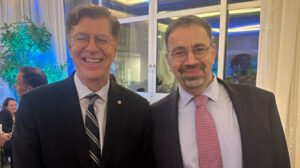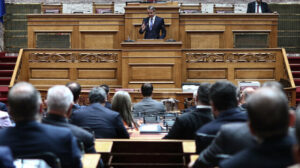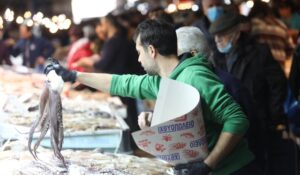At the Economist conference in Athens, renowned economist and Nobel Prize winner Daron Acemoglu received the thrilling news of his Nobel win. As shared by Professor Kostas Synolakis, a prominent academic in the field of Natural Disasters, Acemoglu found out about his prize during the conference and handled the moment with remarkable humility.
Synolakis described the event in detail:
“It’s not every day that a scientist focusing on natural disasters speaks at a conference where one of the attendees wins a Nobel Prize right in the middle of the event. This happened at the Economist Sustainability Summit, which took place on Monday and Tuesday in Athens. Daron Acemoglu learned he had won the Nobel Prize in Economics for his groundbreaking work on how government institutions impact a nation’s prosperity. His co-winners are Simon Johnson and James A. Robinson. Acemoglu and Johnson are both professors at MIT, while Robinson teaches at the University of Chicago.”
Upon receiving the call informing him of the honor, Professor Acemoglu calmly returned to the conference as if nothing extraordinary had happened. Of course, this major achievement became the main topic of conversation among the attendees.
Acemoglu and Robinson are also well-known for co-authoring the influential book Why Nations Fail, which Synolakis highly recommended to the audience.
Synolakis added his congratulations: “A huge congratulations to all three recipients for this incredible honor, especially to Daron Acemoglu for his brilliant and humble nature. He continued to engage with everyone at the event, including attending the evening dinner, without any pretense. He’s a fantastic role model for young economists.”
Joseph Stiglitz, who won the Nobel Prize in Economics in 2001 for his work on asymmetric information in markets, was also present at the event, further adding to the prestige of the moment.

“I feel shocked and awe, I was very happy about the award”
Daron Acemoglu spoke to ERTNews in his first television interview since receiving the award. The professor is known for his theory linking economic growth to the institutional adequacy of a state, and in his interview he talks about the use of artificial intelligence and how it can collectively benefit society. He was in Athens to speak at the Economist’s 8th Sustainability Conference on Europe and the Mediterranean.
“I am very happy for the award but I am also very happy to be on Greek public television,” Mr. Acemoglu said at the beginning.
On the Nobel Prize for Economics, which he was awarded, he said: “I feel shock and awe, I was very happy and I am very happy that it happened in Athens, a beautiful city. I am writing about Athens, the birthplace of democracy so it is next to important when it is a prize related to my institutions and democracy.”
I am very happy and shocked to see that this is a wonderful city, I am very happy and excited about it, it is a wonderful city, it is a wonderful city.
Asked to answer what he believes is the biggest problem in the global economy, he said: “The interesting thing is that there are a lot of different problems and the fact that they are all happening at the same time is kind of special.
The global population is aging faster than ever before and that creates big challenges. AI inequalities, work, and its future, climate change, and above all democracy. Democracy is in crisis and support for it is at very low levels in the industrialised world where no one thought it would collapse. We need democracy more than ever because only democracy and democratic discourse can build consensus on these important problems. I see them not only as a danger but also as opportunities. We can build a better economy if we use AI in the right way, we can reduce inequalities rather than reinforce them, and we can create jobs rather than destroy them.”
Referring to the upcoming US elections, Acemoglu noted: “I will vote for Kamala Harris and yes I believe Trump is a danger. Kamala Harris is a good candidate on many levels and I think she deserves our vote.”
Ask me anything
Explore related questions





